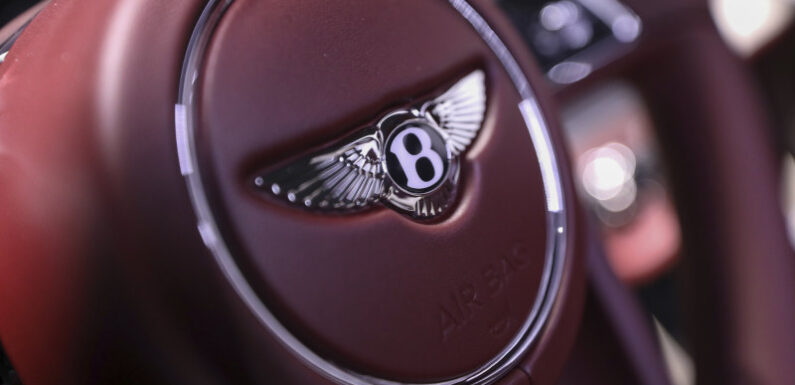
Save articles for later
Add articles to your saved list and come back to them any time.
What in the World, a free weekly newsletter from our foreign correspondents, is sent every Thursday. Below is an excerpt. Sign up to get the whole newsletter delivered to your inbox.
Singapore: Like many kids their age, my two boys are rather transport obsessed. Buses, trains, they’re wrapped up in it all and after nearly three years in Singapore they seem to have just about every service and route etched into their eight and seven-year-old minds.
The fascination extends, of course, to prestige and sports cars their parents can’t afford and which are anything but a rarity in the Asian finance hub.
Singapore has introduced Certificates of Entitlement for car ownership to avoid the traffic congestion that clogs many other Asian cities.Credit: Lauryn Ishal/Bloomberg
“What’s that one, Dad?” the eldest asked last weekend, spotting a particularly sleek and luxurious looking machine in front of our Grab ride (that’s Singapore’s version of Uber).
Before I could make out the badge, our driver answered: “That’s a Bentley.”
Still curious, my youngest followed up: “How much does one of them cost?”
“More than a million dollars,” replied the driver.
Woah.
Clearly, a Bentley is a very pricey set of wheels, beyond the grasp of most, no matter what country you’re in. Here in Singapore, however, it is not just premium vehicles that cost a relative fortune. The island nation of 6 million people is the world’s most expensive place to own a car because of a quota system that limits the number of vehicles on the road.
To buy a car, Singaporeans and expats here must bid for a 10-year Certificate of Entitlement – essentially a permit – and the cost has soared to record levels in the past month.
A certificate for a so-called Category B vehicle, a class that includes popular crossover SUVs, as well as larger and more upmarket cars, is now costing buyers $SGD150,000 ($172,000), while permits for more basic, less powerful Category A vehicles are selling for up to $SGD106,000.
The clincher is: that cost is on top of the price of the actual car. It means that with other fees, including a customs duty, GST and additional taxes, new Subaru Foresters, for example, are on the market here at more than $SGD200,000 ($230,000). In Australia, they start at just under $40,000.
Bentleys, Ferraris and the like are marked up even more by luxury car taxes.
The eye-watering price tags are indicative of a city that was last year named alongside New York as the costliest on the planet by the Economist Intelligence Unit, and which has attracted an influx of new offshore wealth since the global health crisis.
Singaporeans are used to paying over the odds to drive in a country where the median annual household income is $SGD121,188, according to Reuters. But as the cost of new car certificates has soared from as low as $SGD30,000 during the pandemic, many are having to reconsider their options.
A Bentley Flying Spur in Singapore.Credit: Bloomberg
Neo Tiam Ting, a car dealer and president of the Singapore Vehicle Traders Association, says demand has been driven by businesses and ride-hailing providers beefing up their fleets during the city-state’s comeback from COVID-19.
All the while, the vehicle population, as he calls it, has remained set at less than 1 million, with car and motorcycle numbers frozen and only a fractional lift in commercial vehicles allowed. The freeze, to prevent the traffic jams that clog the streets of other south-east Asian cities, was imposed in 2018 and will remain in place until 2025.
“The individual user will be suffering because Category A and B are mixed together having to bid [for certificates] against businesses,” Ting says. “For people who still really need the car for family use or their own job use, they’ve got two ways. One is they own the car, with the higher price. The second alternative some people turn to is leasing a car for one or two years. They don’t need to come up with a down payment, just the monthly rental, but it is still high.”
Car sharing is another concept that has been raised as an alternative for those priced out of owning a vehicle outright. Of course, second-hand vehicles are cheaper but they naturally have fewer years remaining before their 10-year certificates expire. When that happens, owners can either splash out for another five or 10-year permit or sell the car to a scrapyard or exporter.
It all comes down to personal priorities, says civil servant Allan Shew. He told me he and his wife Beekhin, a tax consultant, own two cars, a Mercedes and a Volkswagen, both of which they bought second-hand. They have two children who they ferry around, but that’s not the only reason they choose to own cars in a geographically small city that is well-connected by public transport.
“I always believe that everyone places value on different things,” he says. “Some people are willing to spend their money on travelling, some on watches … but myself and my wife, both of us are car lovers despite knowing they are depreciating assets.
“We work so hard and spending on something we like is just one way of rewarding ourselves.”
As for my family, we’ve managed to make do without a car during my posting here. Fortunately, my sons are more than happy with the bus.
Get a note directly from our foreign correspondents on what’s making headlines around the world. Sign up for the weekly What in the World newsletter here.
Most Viewed in World
From our partners
Source: Read Full Article

